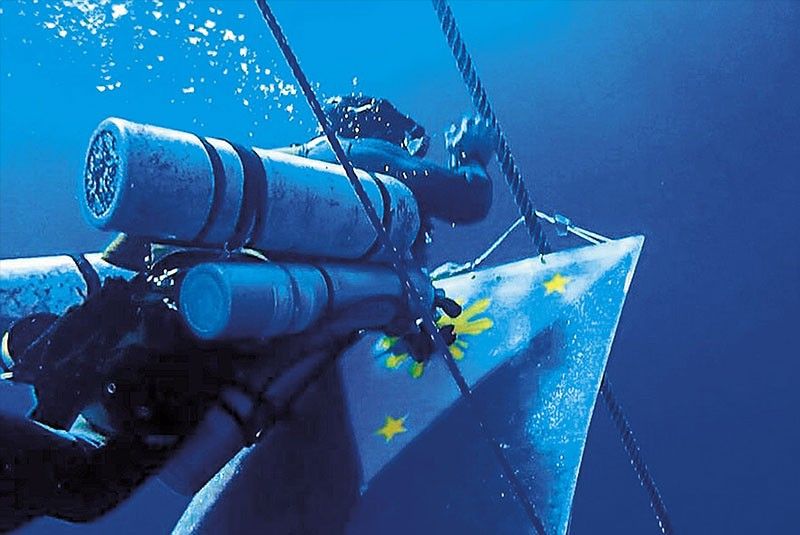Benham


A year ago, a large underwater plateau east of Luzon was recognized as an area over which the Philippines exclusively enjoys sovereign rights. The recognition was a source of national celebration.
Proudly, we renamed Benham Rise to underscore our possession. It is now officially the Philippine Rise, although there is a bit of awkwardness in using the new designation. A few years ago, the Aquino government decided the South China Sea should be called West Philippine Sea. Hardly anyone uses that designation. It is hard to defy habit, even if only for place names.
Unless we are able to harvest minerals or natural gas from the area, our sovereign rights over the Benham Rise will be more of a burden than a boon. Without deriving any economic benefit from this area, we bear the responsibility to maintain patrols over this part of the ocean as well as regulate all human activity that might degrade the rich marine resources underneath the shallow waters.
The underwater plateau is, without doubt, extremely valuable. It holds a diversity of marine life and functions as spawning ground for fish. If it is damaged, the already thin supply of fish around our archipelago will be thinner still.
Last Tuesday, President Duterte issued a proclamation declaring a large part of Benham Rise a marine reserve. That is a wise and responsible thing to do. But it also means there will be little or no commercial activity in this area into the foreseeable future.
The underwater plateau is not much of a tourist attraction. From the surface, there is nothing but water out there. Only a small number of highly skilled deep sea divers will venture to this area to marvel at the rich marine life the plateau hosts.
A team of marine geologists will be deployed to the Benham Rise. It will require much research to determine if there are benefits to our economy. The research will likely take years.
In the meantime, we have tasked the Philippine Navy and the Coast Guard to plant buoys and markers across the plateau. They are more important as navigational guides than any indication of possession.
The Chinese names of areas of the plateau, given by research teams deployed many years ago by Beijing to conduct scientific studies and map out the underwater features, will stay. The Chinese beat us in the naming game. We are too late in contesting the internationally registered names.
For many years, only a handful of geologists knew Benham Rise existed. While the country sought international recognition of our sovereign rights over the area, we did not deploy scientific teams to scour the area, map it and name its parts. We are never very good at doing these things.
Last Tuesday, President Duterte travelled to Casiguran Bay to, at least ceremonially, underscore the sovereign rights we enjoy over Benham Rise. Nothing could be seen from Casiguran.
The Presidential Security Group successfully dissuaded Duterte from jet skiing toward the invisible rise. The weather was simply too hot for someone the President’s age to risk exposure in the sun.
Fortunately, Duterte yielded to the wise counsel of his security people. Going into the water would have been a crass photo opportunity more likely to be ridiculed than praised.
Snag
With less than a month to go before the scheduled historic meeting between Donald Trump and Kim Jong-un, there is sudden uncertainty over the meeting even taking place.
The other day, the North Korean state news agency reported that talks between Pyongyang and Seoul have been suspended. The reason given was that “provocative military disturbances,” referring to the annual joint air force exercises between the US and South Korea, were being undertaken.
Those “disturbances,” Pyongyang says, violate the agreement reached in the recent summit between Kim and Moon that both sides will cease all hostile acts against each other. Recall that a day before the summit, South Korea dismantled the huge loudspeakers it maintained at the border to bombard the north with propaganda around the clock. North Korea, shortly after the summit, announced the dismantling of its most important nuclear missile facility.
Pyongyang now indicates the routine military exercises between South Korea and the US is now considered a hostile act. This is clearly a deftly calculated diplomatic move to exact concessions from the US. If the routine military exercises are called off, Pyongyang scores a diplomatic victory. Such a victory is probably much needed at home, as Kim Jong-un tries to assuage his constituency that there is much to gain from the more conciliatory diplomatic tack the leader has taken.
Both Washington and Pyongyang have invested much in the forthcoming Trump-Kim meeting.
Only months ago, the most hawkish politicians in Washington were angling to deal the Kim regime a bloodied nose by way of a limited military strike. No one was more hawkish than Trump himself, who wanted his senior officials to order the evacuation of thousands of dependents of US military personnel in South Korea. That would have sent such an ugly signal all diplomatic options might have been closed. Fortunately, Trump’s own officials hewed and hawed, allowing the instructions to get lost in the bureaucratic maze.
With all of Trump’s public boasting the past few weeks, Pyongyang is wary of coming under intense pressure in the run-up to the summit to commit to some hazily defined process of “denuclearization.” Hinting that the talks may themselves be cancelled is clearly a method for Pyongyang to leverage back.
- Latest
- Trending























